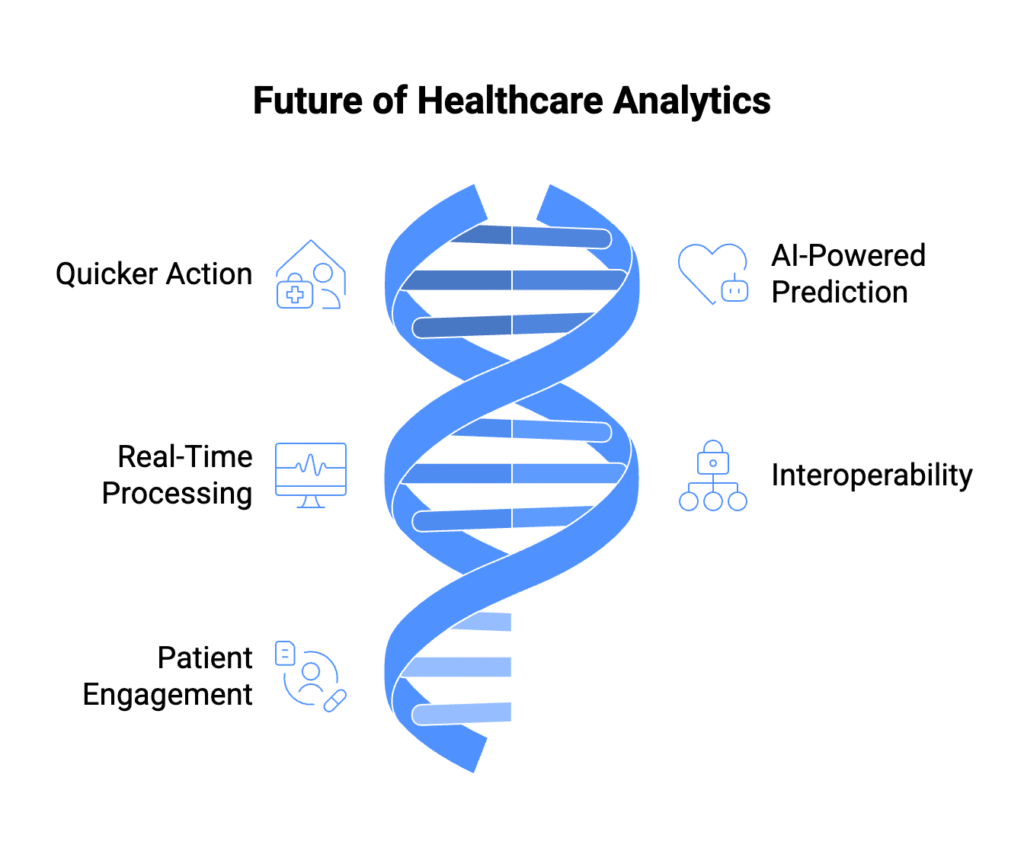Data analytics in healthcare is changing everything. From saving lives to cutting costs, it’s the force behind smarter medical decisions.
Experts say the global healthcare analytics market is on track to cross $133 billion by 2029. That’s not just a big number. It shows how much healthcare is investing in smarter, data-driven care, and how the tools for analyzing health information are becoming standard in nearly every hospital and clinic.
Healthcare professionals and managers face everyday challenges—rising costs, staff shortages, complex patient needs, and paperwork overload. Using data analytics, they are starting to see real solutions that actually work.
Drive Healthcare Transformation with Custom Data Analytics Solutions by Kanerika
Transform your healthcare delivery today – Partner with Kanerika for enterprise-grade analytics that put patient care first.
What Data Analytics Means for Healthcare
Healthcare data analytics means sorting medical information—patient records, lab results, treatment histories—and making sense of it. The goal is to help doctors, nurses, technicians, and administrators make better decisions. This isn’t about replacing people. It’s about making every team member more effective.
Think of it as a reliable assistant. It checks patterns in patient symptoms. Finds small changes in lab values. Flags potential treatment problems early. And it handles all this without a break, so insights arrive fast.
Dozens of healthcare systems now run analytics in real time using cloud platforms, making information available to authorized staff anytime. That leads to faster responses and better-coordinated care.

Key Benefits of Data Analytics in Healthcare
Improved patient outcomes
Analytics spots risk factors for heart disease or diabetes before symptoms even appear. Doctors can prevent emergencies, not just treat them after the fact. Moreover, hospitals using AI-based analytics report higher accuracy in diagnosis and treatment selection, according to Deloitte. With over 80 percent of major hospitals now using AI, the change is happening everywhere.
Cost savings for families and facilities
Unnecessary tests waste money. Redundant procedures slow care. Data analytics highlights these problems, so teams fix them sooner. More coordinated departments mean less paperwork and lower bills for patients and hospitals alike.
Faster breakthroughs
Drug research takes years and costs millions. With healthcare analytics, researchers spot promising treatments and patterns in genetic data much faster. This helps bring new drugs and therapies to patients sooner.
Prevention
About 30 percent of all healthcare data can now be used in real time. Additionally, by analyzing vital signs and patient records quickly, hospitals predict and prevent emergencies—cutting mortality rates and reducing ER visits for chronic conditions.
Real-World Applications
Electronic health records (EHRs)
EHR systems store everything: medical history, treatments, outcomes. Moreover, analytics tools link up this data for nurses and doctors. Success stories like Kaiser Permanente’s HealthConnect show better care coordination and reduced costs.
Kaiser Permanente sets a standard for integrated healthcare by coordinating primary, secondary, and hospital care through tightly connected services, evidence-based practices, and shared health records. Their integrated system spans clinics, hospitals, labs, and pharmacies—giving patients access to most of their care in a single facility. A dedicated electronic medical record platform, KP HealthConnect, lets medical teams instantly view up-to-date information and track care pathways. This approach means fewer gaps in care, better patient outcomes, and measurable cost efficiencies.
Staffing predictions
Hospitals use analytics to forecast daily and hourly patient loads. This improves staffing, so no department is short-handed or idle. Moreover, quality of care goes up when the right team is always on shift.
Additionally, McKinsey’s report on clinical operations excellence shows that hospitals undergoing operational transformation—especially those using analytics to manage productivity and decision-making—achieved 5–10% improvements in operating costs and increased stakeholder satisfaction. These hospitals focused on metrics like OR utilization, average length of stay, and emergency department throughput, all of which are directly impacted by accurate forecasting and staffing.
Monitoring with wearables
Devices track blood pressure, heart rate, and sleep patterns. Doctors get instant alerts for changes and can intervene rapidly if needed.
Hospitals in Southeast England fitted discharged patients with Wi-Fi-enabled wearables that tracked vital signs like oxygen levels, pulse, and temperature. The data was analyzed in real time using AI, allowing clinicians to intervene early when patients showed signs of deterioration. This approach, as described by HBR, reduced emergency readmissions and improved post-discharge outcomes, showing how wearables and analytics can enhance care quality and efficiency.
Addressing the opioid crisis
Analytics identifies individuals at higher risk by analyzing insurance and pharmacy records. Early action helps prevent opioid abuse and its consequences.
Massachusetts’ Chapter 55 initiative used analytics to study insurance and pharmacy records, revealing that patients prescribed opioids for three months were four times more likely to die from overdose within a year. By identifying high-risk individuals early, healthcare providers were able to adjust prescribing practices and offer timely interventions—showing how data can help prevent opioid abuse and save lives.
Strategic planning for better services
Healthcare managers use analytics to learn why people skip checkups, avoid treatments, or face access issues. This helps them target services where they’re needed most.
Geisinger Health System used big data analytics to understand patient behavior and improve service delivery. By integrating pharmacy, genomic, and clinical data, they identified gaps in care and redesigned services to better meet patient needs—such as expanding home care and mobile outreach.
Better medical imaging
Algorithms analyze thousands of scans and assist radiologists in identifying problems quickly. This boosts accuracy and speeds up case reviews.
AI tools in life sciences are helping radiologists analyze thousands of scans with greater speed and precision. These algorithms support early detection of chronic diseases and reduce diagnostic errors, especially in high-volume imaging environments.
Telemedicine advancements
Predictive analytics makes remote care proactive. Hospitals intervene earlier, reducing admissions, saving money, and improving access, especially in rural areas.
Intermountain Healthcare used telehealth to connect rural clinics with specialists in larger hospitals. This approach improved access, reduced unnecessary admissions, and ensured timely care for patients in remote areas—demonstrating how predictive analytics and virtual care can work together effectively.
How Are Innovative Manufacturing Industry Trends Driving Growth in 2025?
Explore how cutting-edge trends like AI-native factories, smart robotics, and resilient supply chains are reshaping manufacturing and fueling growth.
Current Challenges of Data Analytics in Healthcare
Healthcare data analytics faces major obstacles that limit its potential. These challenges affect how organizations collect, process, and use patient information for better care.
Security breaches remain the biggest threat
In 2024, the USA alone had 585 incidents of data breaches with 180 million compromised user records. The numbers are staggering. In 2024, there were 14 data breaches involving more than 1 million healthcare records, including the biggest healthcare data breach of all time that affected an estimated 190,000,000 million individuals. Between January and September 2024, healthcare organizations in the United States saw 491 large-scale data breaches, resulting in the loss of over 500 records.
Data fragmentation creates operational nightmares
One of the biggest challenges in developing such apps is the distribution of health information among many databases, or “data structure.” Patient records sit in separate systems that don’t talk to each other. Electronic health records, lab results, imaging data, and pharmacy information exist in isolated silos.
IT Governance vs Data Governance: What is the Difference?
Confused between IT Governance and Data Governance? Discover the key differences that define strategic control in the digital age.
Unstructured data complicates analysis
The huge size and highly heterogeneous nature of big data in healthcare renders it relatively less informative using the conventional technologies. Most healthcare data comes from doctors’ notes, radiology reports, and clinical observations written in natural language. Traditional analytics tools struggle with this format.
Storage and processing demands overwhelm systems
In every area, big data challenges are as follows: storing, searching, capturing, sharing, and analyzing data. Healthcare generates massive amounts of information daily. Medical imaging alone produces terabytes of data per facility. Current infrastructure can’t handle the volume or speed required for real-time analysis.
These technical barriers prevent healthcare organizations from extracting meaningful insights that could improve patient outcomes and reduce costs.
Trends Shaping Healthcare Analytics
Healthcare analytics keeps changing. For 2025 and beyond, the focus is:
- Quicker action—making insight available before problems get worse
- AI-powered prediction—using machine learning to forecast patient needs and automate complex workflows
- Real-time processing—instant response to changes in health status
- Interoperability—connecting all hospital systems for seamless data flow
- Patient engagement—smart devices and apps help people manage their health themselves
Artificial intelligence has emerged as the primary catalyst for change. However, it’s not just about automation—IDC’s August 2024 survey found that 26.1% of healthcare organizations are actively implementing AI-powered clinical decision support tools. Moreover, more than 70% of healthcare institutions now use cloud computing to facilitate real-time data sharing and collaboration, enabling predictive analytics that can identify disease patterns before symptoms manifest.
Nevertheless, the industry faces implementation challenges. While descriptive analytics remained the largest revenue contributor, holding 46.3% of the healthcare analytics market share in 2024, organizations are gradually shifting toward predictive and prescriptive models. Furthermore, generative AI has captured significant attention throughout 2024, particularly for streamlining administrative processes. However, questions persist about effective scaling and implementation strategies, indicating that while the foundation is strong, the healthcare analytics revolution is still in its early stages.

Getting Started with Data Analytics in Healthcare
Smart analytics starts with clear questions. What problems need solving? What data is available? Are the right people and tools in place?
Success depends on:
- Quality technology and analytical tools
- Teams that understand healthcare and data science
- Sound data governance and privacy protections
- Reliable, clean data from the beginning
Best practices suggest starting with smaller projects and subprojects, aiming at high-impact use cases to gain momentum and trust in the eyes of stakeholders for more advanced data analytics healthcare initiatives.
Moreover, the technical barriers shouldn’t overshadow the human element. 62% of physicians and nurses report symptoms related to burnout, highlighting why data analytics initiatives must prioritize user experience and workflow integration.
Furthermore, compliance remains paramount—HIPAA indicates almost 18 components of PHI that must be ensured, making data governance a prerequisite rather than an afterthought.
Therefore, successful healthcare analytics implementation requires a phased approach: establish data governance frameworks first, then pilot small-scale projects that demonstrate immediate value while building organizational capability and trust.
Kanerika’s Capabilities for Healthcare Data Analytics
Kanerika stands as a transformative force in healthcare analytics, delivering comprehensive solutions that bridge the gap between raw medical data and actionable insights. The company’s expertise spans data integration, predictive analytics, AI-driven intelligence, and cloud architecture—empowering healthcare organizations to make informed decisions that directly impact patient outcomes.
Core Capabilities That Drive Results:
Big Data Excellence: Kanerika manages millions of healthcare records across diverse formats, enabling both clinical research breakthroughs and operational efficiency improvements. Their robust infrastructure handles everything from electronic health records to imaging data with seamless integration.
Advanced Data Preparation: The company excels at removing inconsistencies, standardizing disparate sources, and ensuring data quality—critical foundations for reliable healthcare analytics where accuracy can mean the difference between life and death.
Predictive Intelligence: Through sophisticated modeling techniques, Kanerika forecasts patient needs, identifies at-risk populations, and optimizes resource allocation, helping healthcare providers stay ahead of demand curves rather than simply reacting to them.
Cloud-Native Security: Their cloud enablement services establish scalable, HIPAA-compliant storage solutions that meet stringent healthcare security standards while providing the flexibility modern healthcare systems demand.
Telemedicine Integration: Recognizing the growing importance of remote care, Kanerika seamlessly incorporates analytics into telehealth platforms, enabling rapid decision-making regardless of physical location.
Operational Optimization: By automating routine processes and eliminating manual workflows, they dramatically improve hospital operational efficiency while reducing the administrative burden on clinical staff.
Proven Track Record Through Real-World Impact:
Dr. Reddy’s Digital Transformation: Kanerika’s work with Dr. Reddy’s Laboratories exemplifies their healthcare analytics prowess. Kanerika’s data architects worked with Dr. Reddy’s to design and deploy a data lake serving 15+ use cases, including SAP-enabled supply chain, sales, inventory, marketing finance, and HR applications. Moreover, this comprehensive implementation delivered remarkable results—Dr. Reddy’s experienced a 45% reduction in response times and 40% decrease in data errors following deployment.
Global MedTech Revolution: Another compelling case involves a global digital healthcare leader who needed to address siloed data systems by providing senior management with real-time business intelligence to drive business growth and giving operational teams better tools for improving revenue, costs, and patient safety and satisfaction. The challenge was significant—like many multinational firms, their maturing, disconnected data systems meant information wasn’t consistently defined across departments.
Healthcare Invoice Automation Success: Additionally, Kanerika’s automated invoice processing project for a healthcare provider demonstrates their operational expertise. The process of consolidation which earlier used to take a week’s time can now be executed within hours, with significant improvement in workforce productivity and business performance through automation of data consolidation and analytics. Furthermore, this implementation reduced cost, complexity, and security risks while creating an analytics platform that scales across the entire organization.
Centralized Analytics Platform: Their platform modernization projects consistently deliver transformative results, including improved decision-making processes, enabling organizations to make informed and strategic choices based on real-time insights, while increasing operational efficiency through faster data retrieval and reduced manual handling.
Drive Healthcare Transformation with Custom Data Analytics Solutions by Kanerika
Transform your healthcare delivery today – Partner with Kanerika for enterprise-grade analytics that put patient care first.
Strategic Partnerships That Guarantee Excellence:
As a certified Microsoft, AWS, and Informatica partner, Kanerika delivers enterprise-grade solutions backed by industry-leading technology stacks. However, their true differentiator lies not just in technical capability but in their deep understanding of healthcare workflows and regulatory requirements.
Their cloud architectures maintain full compliance with GDPR, HIPAA, and SOC II standards, ensuring that patient data security remains paramount throughout every engagement. Nevertheless, they balance security with accessibility, creating systems that protect sensitive information while enabling authorized users to access critical insights when needed.
Kanerika’s approach transforms healthcare organizations from data-rich but insight-poor entities into intelligent, responsive institutions capable of delivering personalized care at scale while maintaining operational excellence.
FAQs
What is the role of data analytics in healthcare?
Data analytics in healthcare helps improve patient outcomes, optimize operations, and reduce costs by analyzing large datasets such as electronic health records (EHR), claims data, and patient feedback. It supports evidence-based decision-making and predictive modeling for disease prevention and resource allocation.
How does data analytics improve patient care?
By identifying trends and patterns in patient data, analytics enables early diagnosis, personalized treatment plans, and preventive care strategies. For example, analyzing readmission rates can reveal gaps in care transitions, leading to interventions that reduce hospital readmissions.
What tools and technologies are commonly used in healthcare data analytics?
Popular tools include SQL for querying, Python and R for statistical analysis and machine learning, and Tableau or Power BI for visualization. Healthcare-specific systems like Epic and Cerner are often used for managing EHR data.
How do analysts ensure data accuracy and integrity in healthcare?
Analysts validate data sources, perform rigorous cleaning, check for outliers, and use automated scripts for error detection. Maintaining detailed logs and applying statistical checks ensures reliability. Compliance with HIPAA and other privacy regulations is also critical.
What are the main challenges in healthcare data analytics?
Challenges include handling missing or incomplete data, ensuring data privacy and security, integrating data from multiple sources, and managing large, complex datasets. Analysts often use imputation techniques and advanced algorithms to address these issues.
How is predictive analytics used in healthcare?
Predictive analytics uses historical data and machine learning models to forecast patient outcomes, such as predicting hospital readmissions or identifying high-risk patients. This helps in proactive care and resource planning.
What ethical and legal considerations apply to healthcare data analytics?
Healthcare data is highly sensitive, so compliance with HIPAA and other privacy laws is mandatory. Analysts must ensure secure storage, controlled access, and anonymization of patient data to protect confidentiality.









